Two ice cream vendors.
Seventeen playgrounds.
One city.
1. OPERATION DESSERT STORM
River Road Park in Salem, Oregon looked lovely that afternoon. It was the summer of 2012 and the long-awaited warm season had brought families to the park, where parents pushed toddlers on swings and children in swimsuits high-stepped through the splash fountain. Nearby, a soccer game kicked up the smell of fresh-cut grass, and on the western edge of the park the Willamette River flowed gently past, making its way toward the Pacific.
In the parking lot beside the playground, a college student named Rick Ferria was selling ice cream sandwiches and Fudgesicles from a modified meter maid trike. The Cushman Truckster was painted with a distinctive blue stripe, and had been outfitted with a large rear cooler and a two-foot tall plastic totem on the roof: soft-serve vanilla. The trike’s speaker broadcast a tinny rendition of Scott Joplin’s “The Entertainer.”

Then the kids on the play structure heard something strange. Across the park, a second ice cream truck turned off of River Road and started heading their way. The vehicle moved at a brisk pace, not the typical crawl of an ice cream truck. What’s more, its sound system blasted a repetitive, bubbly jingle, drowning out Joplin’s ragtime classic.
The interloper wasn’t even a real ice cream truck. It was a 1997 Nissan Quest minivan, seafoam green, covered with neon ads for Bomb pops and Screwballs, and fronted by a shallow, stubby hood that made the whole thing look like a mechanical manatee in colorful disguise. Behind the wheel was a man who’d weathered more than his share of freezer burn and inane music: Efrain Escobar.
Rick fumbled for his phone. “He’s here!” Rick said. “He’s heading right for me!”
Rick was new to running ice cream, but he’d been instructed by his boss, Dennis Roeper, the proprietor of Keizer Ice Cream, to call if that minivan showed up. Keizer was a regional, mid-sized outfit that reliably delivered frozen concoctions to Salem youth from a small fleet of three-wheelers. Over the years, Dennis had always taught his drivers a code of conduct that prioritized courtesy toward customers and competitors alike. If you came upon another vendor already parked somewhere, turn down your music, give a polite wave, and carry on to a new location.
In recent years, however, Efrain had arrived on the Salem ice cream scene like a scourge, flouting any tradition of fair play. Rick had heard from Keizer’s drivers about the marauder and his ungentlemanly tactics: tailgating, stealing customers, trespassing on turf. Now he was here, on a collision course.
Before Rick could even ask Dennis what to do, it was too late. Efrain had closed in, veering right at the last minute and stopping directly in front of Rick’s trike. The maneuver put the van closer to the play structure so kids would reach his truck first.
To an outsider there was an obvious solution: Rick could simply back up and reposition. But that would mean violating Dennis’s First Commandment of ice cream truck-driving: Backing Up Kills Kids.
Rick was pinned.
At Keizer’s global headquarters in an old garage 2 miles away, Dennis went on high alert. Once again Efrain was taking up offensive positions against Keizer trucks and trying to intimidate his drivers. Dennis was a big guy: 6 foot 2, nearly 350 pounds, with a head topped with thinning red hair and a surprisingly high-pitched voice. He was usually a calm person, but sitting at his desk, surrounded by freezers, tools, spare parts, and faded posters of Klondike bars, Dennis swelled with anger.
“Stay there!” he shouted to Rick, grabbing the keys to his faded navy blue Ford Explorer. Today’s outrage on the riverbank wasn’t just about etiquette, or even competition. It was the latest escalation in an ongoing war. As Dennis saw it, Efrain’s mode of operation constituted an existential threat to the profession, if not to decency itself. In an apoplectic flurry, he dialed his other drivers and ordered them to converge on River Road Park.
“Drop what you’re doing!” Dennis commanded. “Today’s the day.”


Dennis didn’t start in ice cream. For much of the 2000s, he was a mortgage broker. In that credit-happy era, closing commercial real-estate loans was a good business to be in. Dennis made decent money, and it was through professional kinship that he wooed a title researcher named Dawn, marrying her in 2005.
He looked forward to becoming a stepfather to Jazmyne, Dawn’s four-year-old daughter. They bonded well, but Dennis still felt uneasy, as if he’d missed class the day they handed out the father instruction manual. His own father had been a heavy drinker. When Dennis was twelve, his mother took him and his brother and the $100 she had in the bank and fled. They struggled to get by, and Dennis never shook that sense of financial vulnerability, even when he and Dawn were both bringing in strong commissions. He vowed to be a better dad to Jazmyne — and, later, his and Dawn’s own daughter Riann — than his own father had been.
A few months before the wedding, Dennis was at home when he heard a vaguely familiar tune playing down the street. He felt an involuntary burst of excitement when the melody resolved into the Casio-toned siren song of an ice cream truck. He and his brother had run after those trucks all the time as kids, but now he couldn’t recall the last time he’d seen one. In an instinctive swoop he took Jazmyne in his arms and hurried to the door, thinking: This is what fathers do!
But what they found inching down Woodward Street was a shocking disappointment: a junker of a minivan with a disheveled driver selling ice cream out the side door.
“Whaddaya want?” the guy grunted as he climbed over the jumble of boxes in the back and slid the door open, releasing a waft of mildew. Jazmyne pointed a tiny finger at the SpongeBob Face Pop.
“We’re out.”
Dennis encouraged Jazmyne to pick another one. She settled on a Cyclone, which she unwrapped to find a broken, half-melted mess.
“Hey, this one’s no good,” Dennis pointed out.
“No refunds,” the driver barked and put the car into gear. As he pulled away, Dennis grabbed the disfigured Cyclone and dumped the mess on the guy’s passenger seat. “Then keep it,” Dennis shouted.
When he turned back to Jazmyne, there were tears in her eyes, her hands sticky from a popsicle she didn’t get to eat. Not quite the image of delight and fatherhood that Dennis had intended.

Later, Dennis lay in bed, agonizing about the whole thing. What’s the world coming to if you can’t depend on an ice cream truck? He couldn’t shake the thought. Dennis and Dawn were planning their wedding that summer, but Dennis was distracted. He kept bringing up the Cyclone Incident at night, after Jazmyne was asleep. Eventually, he started wondering aloud what it would cost to get one of those motorized tricycle carts ready for the road and stock it with ice cream. “Well,” Dawn finally said, “what are you going to do about it?”
Dennis picked up two road-weary vehicles for $5,500, a vintage Cushman Truckster and a 12-year-old Westward Go-4. They had more than 100,000 miles between them, but still seemed in good condition. He got the freezers running and found a distributor in Portland who provided him with a starter kit of dry ice, colorful magnets for his trike, and a balanced assortment of products: premium bars, specialty cups, cones, sandwiches. The first time Dennis squeezed his mountainous frame into the cab and drove down Woodward Street felt like a glorious debut. He headed past the scene of the Cyclone Incident where that asshole had nearly ruined the idea of ice cream. Dennis switched on the music, ringing “Turkey in the Straw” and “The Entertainer” into the warm evening air.
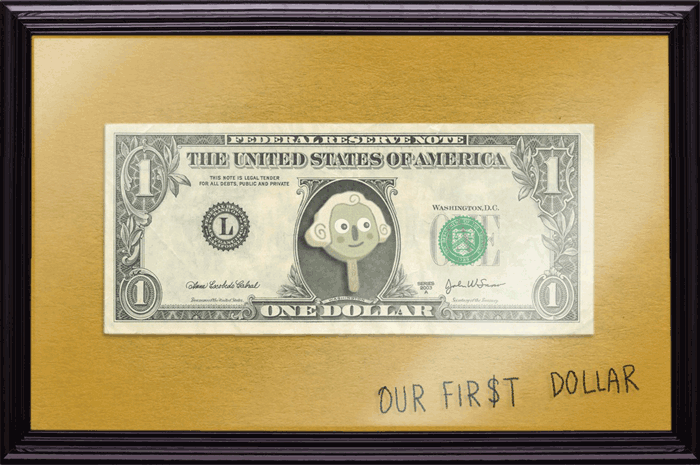
That night he made $50. Soon he was driving most evenings and weekends, earning as much as $200 a shift. More important for Dennis was the spirit of it: children’s eyes going wide when you opened the freezer, releasing that gasp of dry ice smoke. Dennis still put on his tie and brokered mortgages by day, but he spent the rest of his time “selling smiles.”
Then came 2008 and the global financial meltdown. Dennis sometimes worked in private real estate, and he had enjoyed helping people buy their first house, plan their futures. But when the crisis came, he went from selling the American Dream to feeling like he’d been a part of the system that nearly destroyed it. The hit to his personal finances was also terrifying — Dennis’s income dropped more than 70 percent.
Yet one thing didn’t change: kids still loved ice cream. Dennis’s rounds in the Cushman felt like an antidote to all the Wall Street chicanery and valuation sorcery. Ice cream was honest. Fortunately, Dawn had landed a stable job with the state government in Salem, and she encouraged her husband to pursue ice cream full time. After all, what was more American than picking yourself up and starting over?
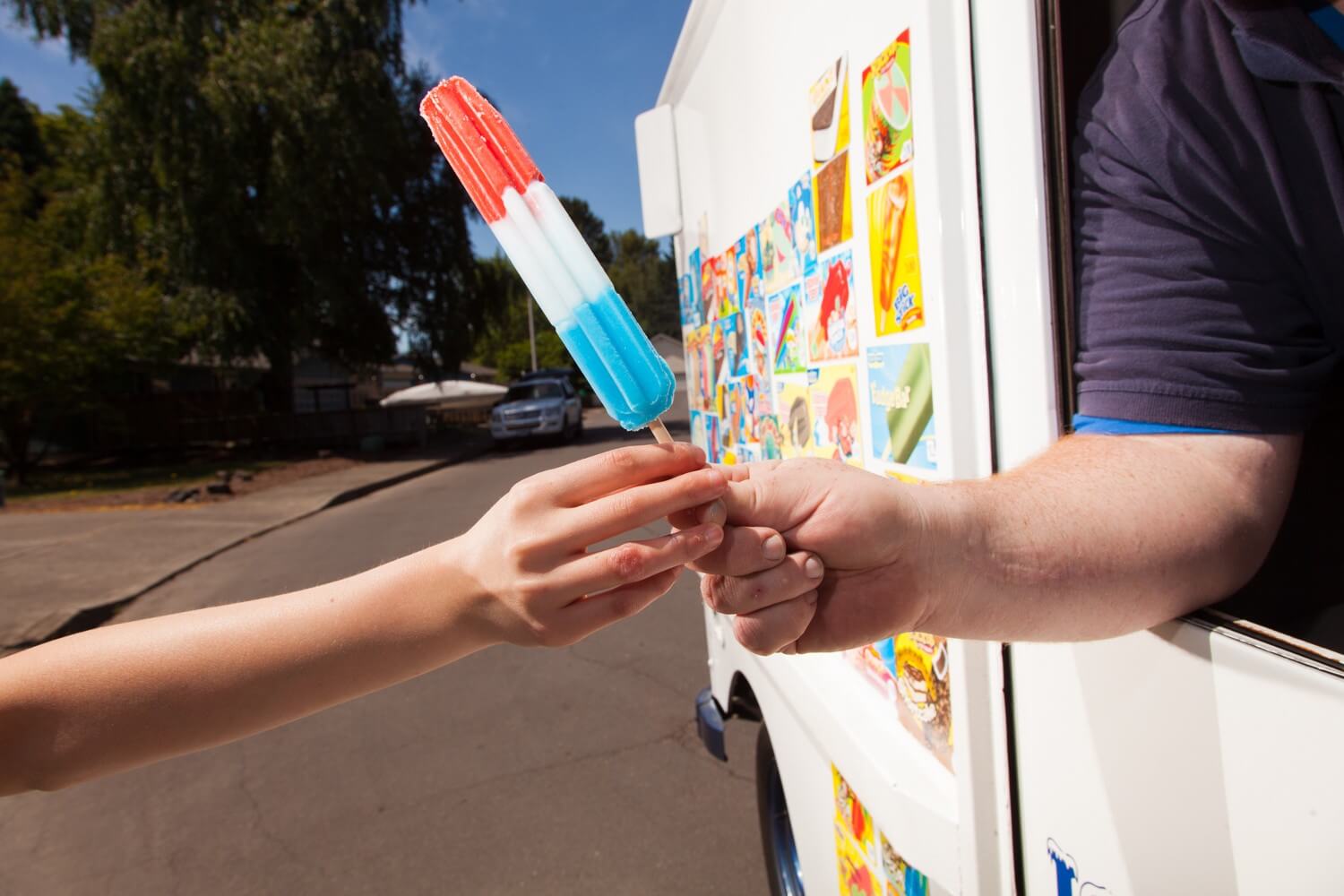
He bought some used freezers, insurance, and a squat little moto-wagon called a Go-4 Interceptor, the traditional workhorse of parking police. He moved Keizer Ice Cream from his house into a rented garage and hired drivers. The business wasn’t ever going to make him rich, but it gave Dennis more time with his wife and daughters. It also gave him something to believe in — something tangible, simple, and sweet.

Dennis slowly advanced on River Road Park, searching for a hidden spot that gave him a full view of the conflict area. He looked like a distinctly suburban battle commander: khaki shorts and pastel golf shirt, cell phone clipped to a chest pocket, and a Bluetooth headset flashing in his ear for instantaneous communication with his units.
One hundred and fifty yards ahead, partially obscured by the picnic pavilion, Efrain was doing brisk business in the parental pickup zone while Rick remained hopelessly boxed in. Dennis’s stealth approach worked: Efrain didn’t see when the rest of the Keizer trikes rolled up beside Dennis’s Explorer, their speakers silent.

Dennis’s cavalry was a reliable but odd bunch. Linda Lou was the first to arrive. She was one of Dennis’s earliest drivers, a shy diabetic in her 50s with short gray hair. The other drivers had nicknamed her “Crash” after a series of unfortunate fender-benders. Yet despite the large dent she’d once put in Dennis’s garage door, he thought of her more as a friend than just another driver. On busy days he would sometimes call to make sure she had taken her insulin. She stopped behind Dennis in her Go-4.
“We’re just waiting on Mike,” he said.
A few minutes later, a plastic ice cream cone appeared in Dennis’s rear-view mirror. It wobbled atop a cart driven by Skinny Mike, aka Mike Roberts, a gaunt, taciturn video game enthusiast. He had a wandering eye and typically wore a black hoodie, but he had a loyal following of customers, and Dennis trusted him without question. Mike took up position in the Keizer phalanx.
Dennis raised his team on the cellular comm link, including Rick, who was still trapped while Efrain slung ice cream with impunity. Rick had thought he was in for an easy summer making some cash selling Blister Pops from a golf cart. He had not anticipated driving into the heart of a turf war with a carnival soundtrack.
“Alright everyone,” Dennis announced. “You know what to do.”

Mike nodded silently and put his trike into drive. Crash had her doubts. “Why are we doing this?” she asked. No one answered. She had always known Dennis to be a gentle soul, but his nemesis was bringing out a different side of him. She remembered one evening a few weeks earlier, when all the drivers were back in the garage for the night, trading stories of their various run-ins with Efrain. A rumor went around that someone saw him catcalling from the window of his van. “I’ve had it!” Dennis yelled, adding that next time, he was going to take the fight to Efrain.
That next time was now. Crash dutifully shifted into drive. Tiny wheels turning, the trio rolled into the fray, as Dennis whispered into his Bluetooth: “Go in there and get the job done.”
2. THE ROAD TO WAR
The cold war began in 2009.
In the aftermath of the financial crisis, Dennis found success in his new enterprise. And personal satisfaction: A well-kept freezer in a Keizer trike never melts down.
Dennis learned to keep his machines purring and was quick to master the tricks of the trade, critical details like route secrets (drivers held theirs close to the vest); neighborhood nuance (stay away from the rich folks with their organic brands); and pragmatic arts like stacking cream-based treats under icy popsicles for thermal control (his distributor once saw a little girl weld an over-chilled popsicle to her tongue.)
It was an unpredictable business, but Dennis was a natural. His fingers didn’t even burn when he handled the dry ice. Margins were tight in ice cream retail, but Dennis knew how to close a sale and was dead serious about customer service. He could handle just about anything: oddly aggressive parents; barter propositions; even a toddler waving a one hundred-dollar bill, presumably plucked from Mommy’s purse. (He made sure that one found its way back home.) Once, a drunk woman paid him a hundred dollars so she could ride along and hand out free ice cream to everyone they met. But even that was fun, because it meant happy kids. There was nothing like rolling back to the garage with an empty freezer after a blockbuster day.

Around Oregon’s capital city, a healthy competition existed in ice cream commerce. There was Aldo, a Godfather-like figure who had been in business for over a decade. Another outfit was Grammy’s Ice Cream, run by a retired couple out of an impressively tricked-out truck. But there was also camaraderie. When Aldo needed a quick loan of Fudgesicles, Dennis told him, “Sure, come on over,” and gave his competitor some from his own inventory.
That was the kind of fair-play attitude Dennis tried to impart to his staff. At the start of each season, Dennis would rally his troops at his garage headquarters with a rousing speech, waxing philosophical about the spirit of the true vendor. He counseled principle and zen-like patience.
“When you’re out fishing, do you run around the pond, cast the line in, rip it out as quick as you can, and run a hundred feet yelling and screaming?” he’d ask. “Ice cream is the same. You have to give it time and let it happen.”
More than anything, drivers had to understand that ice cream was fun. “There’s no room for hate in ice cream,” Dennis liked to remind himself. He preached the importance of treating other drivers with respect, and he authorized his employees to quietly give out free popsicles to kids who had no money.
After patience and generosity came the cardinal rule: safety. Backing up kills children was how he always put it. Dennis knew a thing or two about the dangers out there: when he was 11, he was run over by a car. Miraculously, he survived with few injuries, but the tire-tread bruises on his torso took months to heal, and the experience left him paranoid about children near automobiles.
“There are three things I need from you,” Dennis liked to tell his drivers, punctuating every point with a gesture at the small chalkboard in his garage, which read:
Be safe.
Have fun.
Make $.
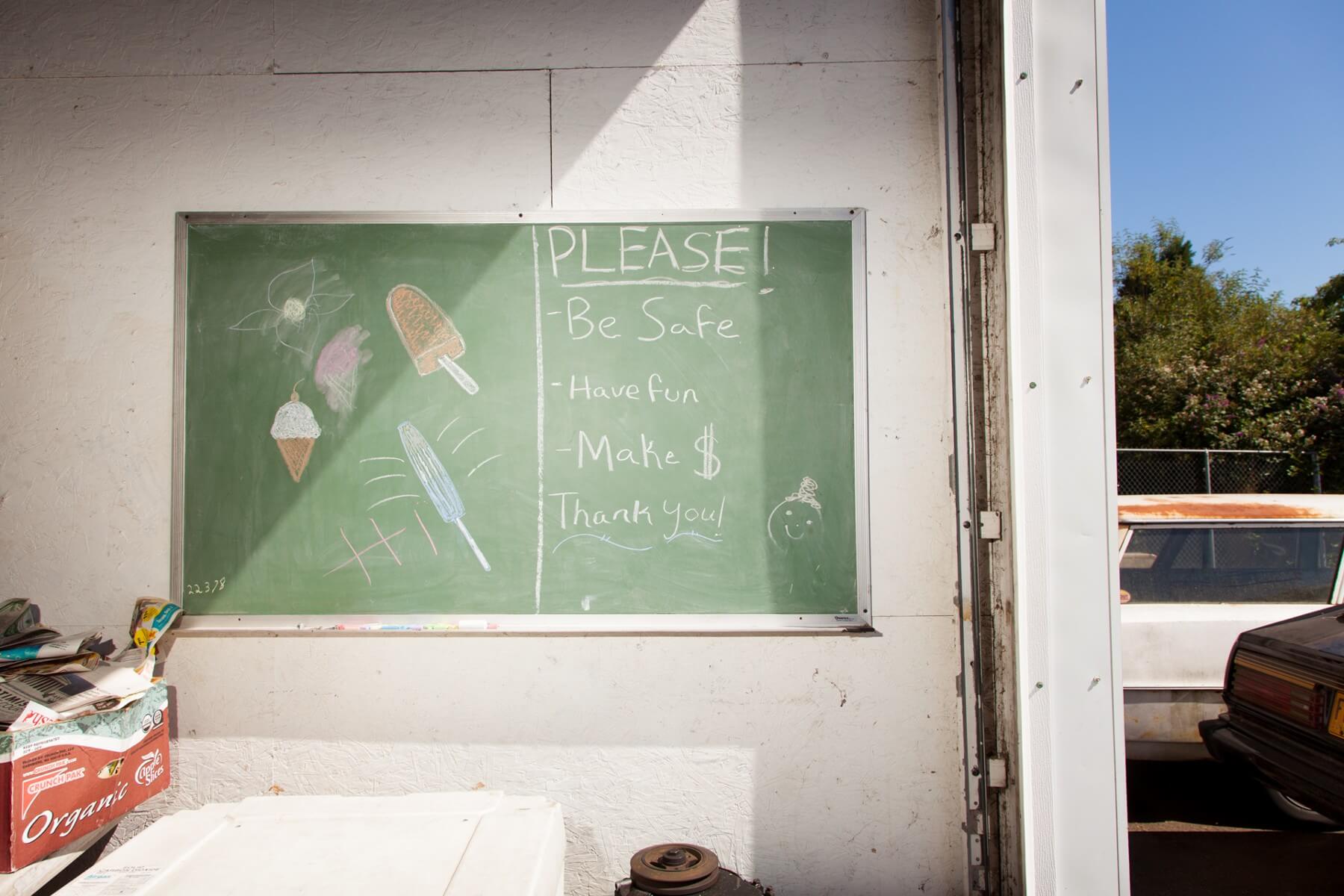
“If you’re being safe,” he’d continue, driving the points home, “you’re going to have fun. If you’re being safe and having fun, you’re going to make money. If you’re not being safe, you’re not going to have any damn fun or make any money.”
By 2009, Dennis’s operation was up to five trikes, although at least one always seemed to be broken down. Still, after four years and thousands of miles, the business had momentum. Dennis was sovereign over his tiny kingdom of calorie peddlers, and he was content.
Until Efrain arrived.
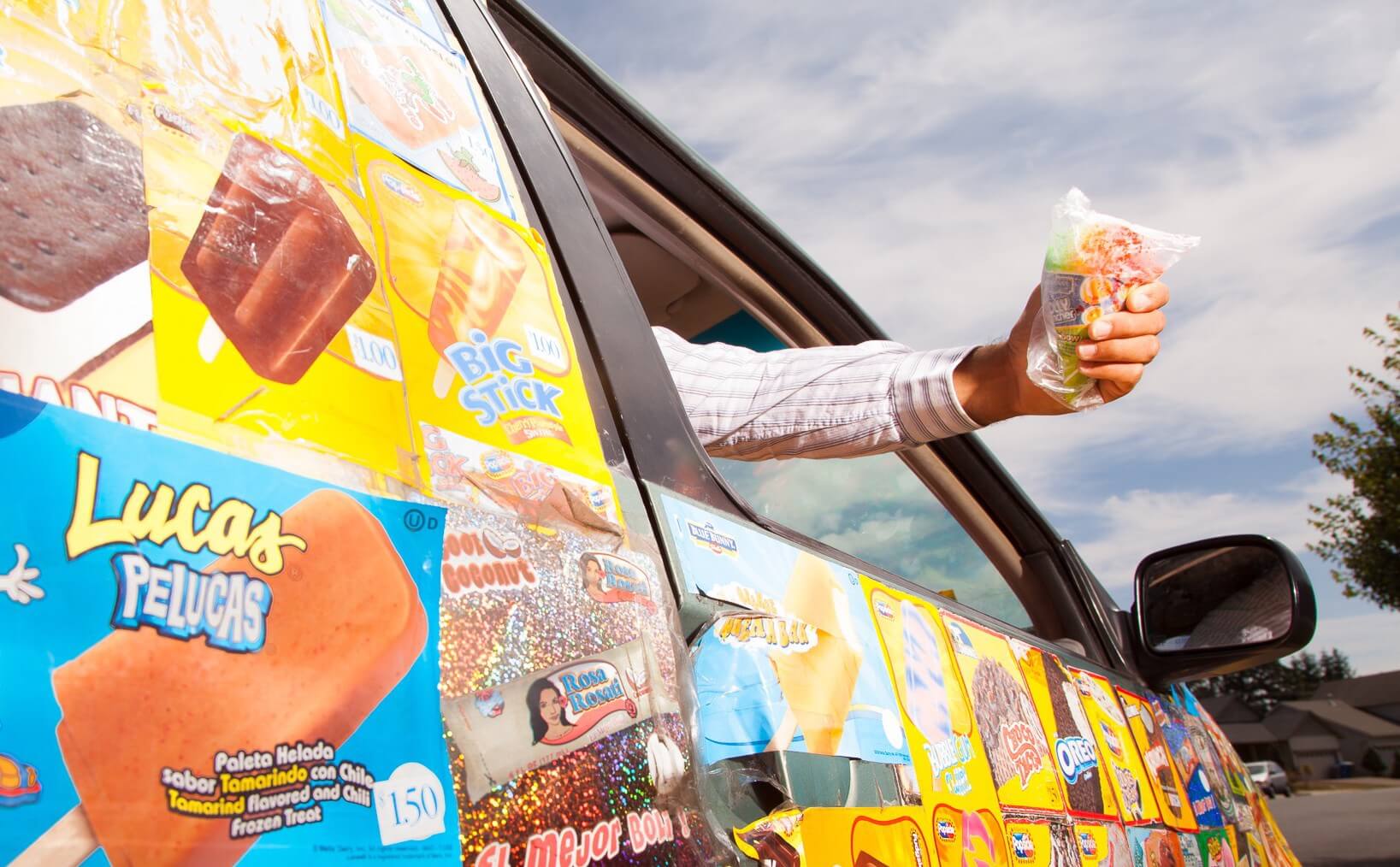

The complaints started right away. The first account came from Crash, who said that another vendor, some mysterious newcomer, had driven right up on her, completely violating Keizer etiquette. He was like a shadow, said Crash, trailing her between the Partridge Lane apartments, Keizer Commons, and Claggett Creek Park.
Dennis complained to the cops, to no avail. “What do you want us to do?” they said. “It’s not a crime to be a dick.”
For a time, Dennis tried to avoid confrontation. He would tell himself: There’s no room for hate in ice cream. When tensions flared at one location, he told his drivers to head elsewhere, places like the carousel on Front Street or the old boat ramp on Glen Creek Road.
But sure enough, Efrain would show up at the new locations too. Eventually, Dennis started to think this was not just an assault on Keizer but a blow to the respectability of his cherished ice cream business.
Then one evening, Crash came back to the garage in tears. Efrain had hounded her all day, she said. She couldn’t drive more than a few miles without seeing that damn minivan in her rearview mirror. Even if she’d wanted to speed away, her Cushman trike could never outrun Efrain’s rig. She was embarrassed she’d let him get under her skin, but she couldn’t take it any more.
Dennis snapped. It had only happened once before, in middle school, where he was teased constantly by a bully named Chris. Dennis was much bigger, but he never saw the point in fighting. One day when Chris mocked his chubbiness yet again, Dennis suddenly found himself lifting Chris off his feet and hurling him into the nearest wall, leaving a dent in the sheetrock. No one was more surprised than Dennis. He got three days suspension, but Chris never bothered him again.
Now, he felt a similar rage. “Where is he?” he said.
“Clearview,” Lou said, wiping her eyes. Clearview Street was in south Keizer, a fast two-minute drive away. Dennis stormed out.
It was dusk by the time Dennis found Efrain, parked in a driveway, still in his ersatz ice cream van and chatting out the window in Spanish with friends.
“Hey!” Dennis barked, striding up. “You need to leave my damn drivers alone.”


Dennis towered over his rival. Efrain gave no sign of recognition at first, which further infuriated Dennis. But Efrain knew who this colossal redhead was.
“Hey man,” Efrain said. “Business is business.”
To Dennis, Efrain’s smile looked smug. “You fucking asshole!” he shouted. Then he gestured for Efrain to step out.
“You better watch your mouth,” Efrain said. He had half a dozen buddies practically within arm’s reach. “I can sell anywhere I want. What are you going to do? Punch me in the face?”
At that point, Efrain’s buddies joined in, yelling along with their friend. Dennis was, after all, on their turf. As they shouted at him to get lost, Dennis started to realize that this was a bad idea. He tried to retreat without losing face, issuing a final warning: “You better watch it, or else.”
As Dennis stormed away into the darkness, Efrain said nothing. The newcomer in the minivan had come too far and worked too hard to risk it all in a pointless brawl.

3. DIA DE LAS PALETAS
The small city of Tlaxco sits high in the Sierra Madre foothills, east of Mexico City. In the colonial town center, the mustard-yellow church of San Agustin de Hipona presides over the city square. For four generations the Escobars had worked the fields in this farming and ranching region. But Efrain’s father had dreams for his family beyond farming. In 1981, when Efrain was an infant, his father opened a butcher shop near the city market.
As a kid, Efrain spent countless hours in the family carnicería. His father was a strict man, but he loved his six children: Efrain and his five sisters. After church on Sundays he would take the family to a nearby park where bicycle vendors sold shaved-ice raspados and fruit paletas.

When Efrain was 8, disaster struck. His father was driving home from work and an axle snapped, sending his truck off a bridge and into a river. Efrain was told his father died instantly. But the boy had little time to mourn. Barely out of third grade, he was now expected to be the man of the house.
Every day after class, Efrain rushed to the shop to help his mother Maria. He worked the cash register and disassembled pigs the way his father had taught him. When he was twelve, he left school to work in the shop full-time. The labor was hard and dirty, wielding a cleaver and hanging carcasses. Eventually he was working up to fourteen hours a day, seven days a week, yet even then his family was just getting by. For his fifteenth birthday, Efrain’s mother couldn’t afford a cake.
One bright spot was Celia, a girl who worked in the market. She would come into the shop and flirt with Efrain, flashing her smile and bright humor. Even though Celia was two years older, Efrain summoned the courage to ask to see her outside of the shop, and soon they were taking evening walks in the plaza, laughing and falling in love.

Celia didn’t care that Efrain was an impoverished, fatherless tradesman, but Celia’s mother disapproved. After six months, she sent her daughter to Puebla, two hours north. The young lovers stayed in touch by mail for a while, but eventually Celia’s letters slowed to a trickle. When Efrain found out she had a new boyfriend, he was crushed. Taking care of his entire family from behind the carnicería counter was even harder with no one to look forward to at day’s end.
Efrain had an uncle in Oregon who had helped some of his cousins enter the United States. When Efrain turned 16, that uncle invited him to come north. Efrain leapt at the chance. He had to borrow the $800 he needed to pay the coyote. It was late December in 1998 when Efrain said goodbye to his mother and sisters and said he’d send money soon. Days later, he and about 20 others walked into the Sonoran Desert near Tecate. A pair of guides told everyone to step in each other’s footprints, then carefully swept away their tracks. The group walked for six hours through the night, crossing the border undetected on Christmas Eve, in silence under the desert stars.

Starting over isn’t easy. In Salem, Efrain was lonely. It was cold and misty and Efrain missed the sun and the mountains. He spoke no English and could find only menial work. Efrain realized that making it to America doesn’t mean making it in America. He had to create his own good fortune.
One summer afternoon, he saw a man selling ice cream out of a truck. He thought back to those pleasant Sunday afternoons in the park with his family in Tlaxco, playing soccer and savoring strawberry helados. In 2006, just as Dennis was launching his own business a few miles away, Efrain bought a freezer and started selling ice cream out of his van. Within a month he’d saved enough to buy two more freezers. He quickly learned the ropes of the frozen-treat trade, and added his own flourish, catering to Salem’s large Hispanic population with hot-buttered corn and fried duros topped with chili and lime.
Efrain worked hard, rarely taking days off. He was one of the few vendors who sold year round, enduring the cold of the dark Oregon winters. He learned English, put up with the overzealous cops who seemed intent on hassling him, and gradually grew comfortable in his new home.
Soon Efrain was earning enough to buy property back in Tlaxco. Over time, the evenings with Celia retreated into memory. He married a woman in Salem, bought a comfortable house on Periwinkle Drive, and started a family. They had three children.
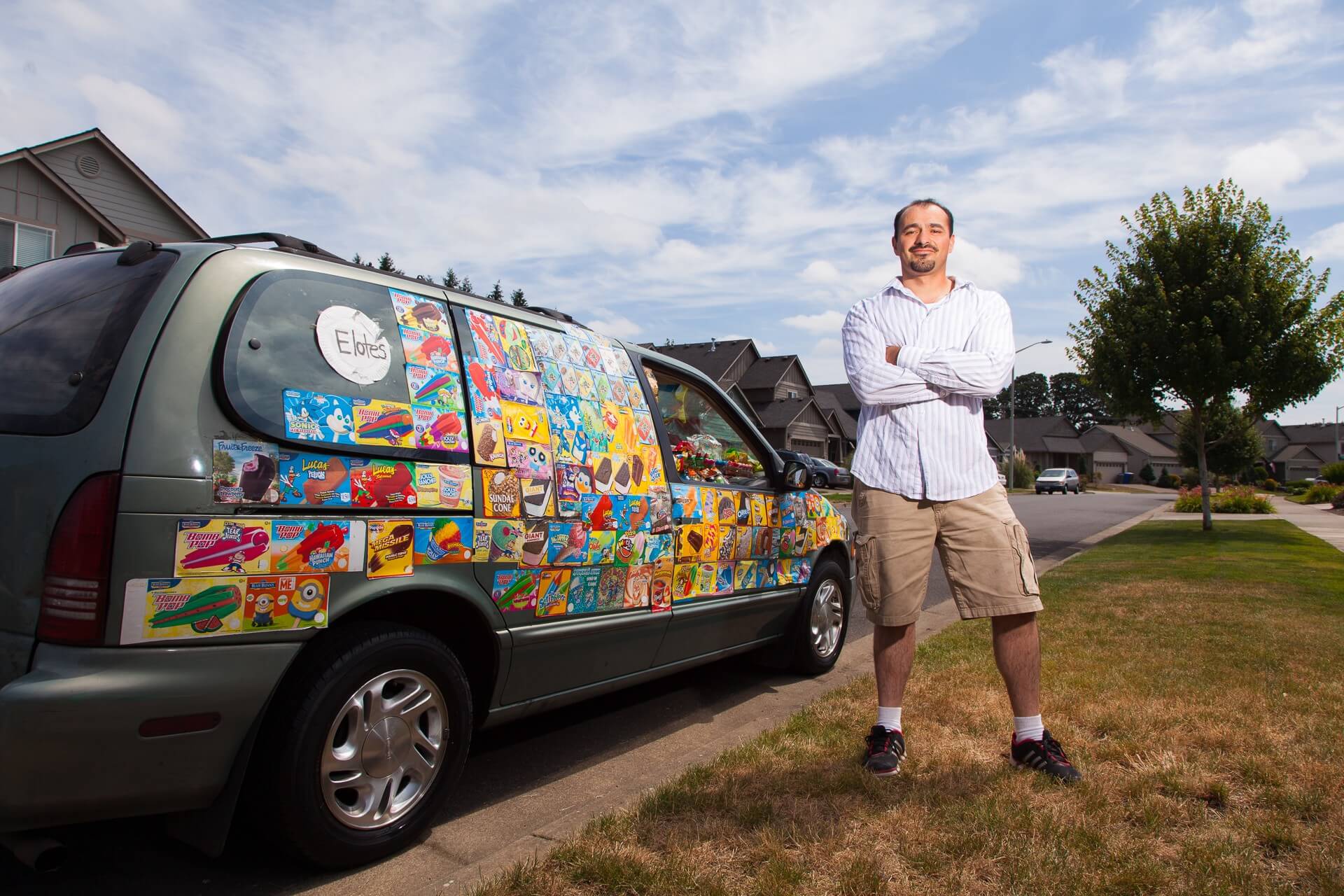

For a long time, Efrain didn’t even know he was anyone’s nemesis. He’d seen the other ice cream vendors around town, including Keizer. He didn’t consider himself confrontational by nature, but the soft-touch sales strategy made no sense to him. He tackled his newfound business with the pluck and determination of a recent immigrant who needed to survive. Besides, there were plenty of kids out there, lots of ice cream to sell, and more than enough places to do it.
But as both rivals became more successful, they began locking horns. Dennis had his grievances about propriety and decorum, while Efrain felt he was the scrappy underdog, hustling to earn a living like any vendor should. Dennis took Efrain’s maneuvers and refusal to back down as a personal affront, and responded with more drastic countermeasures. Efrain in turn felt that if anyone was a bully, it was Dennis, who dominated the roads with his mini-armada of drivers and trikes.
Like all feuds, the one between Efrain and Dennis was based on fragments of truth that had long since been obscured by bitterness. Tempers rose, new lines were drawn, then crossed, and so on, until the evening Dennis found himself standing in a driveway on Clearview Street, inviting Efrain to step out of his van and settle things like a man. Even in the moment, Dennis understood the futility of that exercise. But by that point emotion had eclipsed reason, and each man left that driveway more resentful than before.

A brief pause in hostilities after the Clearview showdown gave way to a long-running war of attrition. Two summers came and went, and feelings hardened. Over time Efrain became the headline in Dennis’s morning speeches to his drivers. “He will follow you,” Dennis would say. “He will pull up on you. He will harass you.”
Eventually, Dennis attempted an economic attack, going after Efrain’s wallet. On days when Keizer drivers complained nonstop about Efrain, Dennis would give the order to undercut him. “Half price over here!” his drivers would yell, drawing children away from Efrain’s van. It was a drastic move that temporarily erased Dennis’s already thin profit margin. His drivers didn’t like losing the commissions, but Dennis said he’d pay them out of pocket. He was willing to lose money if it meant Efrain did too.
But revenue was not the only cost. Selling ice cream was supposed to be a joy, not a vendetta. Even Dennis’s odd but upbeat speeches had given way to somber warnings about his enemy. Whatever happened to “Have fun”?

It was 1:00 AM when the flames woke Efrain’s neighbor.
“Your truck!” the man said, pounding on Efrain’s front door. “It is on fire!” Efrain rushed outside in his underwear, and was astonished to discover his Chevy Astro, its front window smashed, the interior engulfed in flame. It was early September — Efrain’s birthday, as it happened — and after he had taken his family to the State Fair that day, he had left the van in the driveway. Now smoke billowed into the night sky, and the decaled ice cream faces were melting into hideous grimaces. Still in his underwear, Efrain took a garden hose to the fire.

He’d put it out by the time the police arrived, but the Astro’s interior was destroyed. When the cops asked who on earth would attack an ice cream truck, Efrain told them about his ongoing battle with the Keizer crew. The police never solved the case, but in the tense atmosphere the war had created it didn’t matter. Word spread in the ice cream community that something terrible had happened. People whispered. A Portland distributor put the question directly to Dennis, who denied any involvement. Word got to Dennis that some families in the neighborhood wouldn’t buy ice cream from Keizer. It was rumored that “the gringos burned Efrain’s truck.”

Making matters worse for Efrain, he had just cancelled his insurance. It was a difficult time. He had come a long way from his home in Tlaxco — smuggled himself across a desert, for God’s sake — and withstood plenty of hardship to build something he was proud of, only to watch a big piece of it go up in flames. Yet the fire also stiffened his resolve. Efrain had a second van and another freezer stocked with merchandise. Within a week, he was back on the streets, blasting his bubbly jingle through Salem again.
In the heat of the summer, the cycle spun tighter. Efrain later came to believe that his van was most likely torched by some kids down the block, but the fire was symbolic, a major escalation. Now the conflict was about the conflict itself, and each uptick in brinksmanship edged the parties closer to disaster.
The Cold War had gone to DefCon 1.
4. BLOODY SUNDAE
GO! GO! GO!
Dennis issued his command though the phone to his trucks, and Mike and Crash rolled out to Rick’s rescue at River Road Park. Mike arrived first, pulling his Cushman right up next to Efrain’s driver-side door. As Efrain handed change to a kid, he turned to see Mike no more than four feet away, looking him right in the eye. Neither said a word.
Through the windshield, Efrain then saw Crash park directly in front of his van. From his lookout point, Dennis watched his brightly colored blitzkrieg unfold. His rival was surrounded.
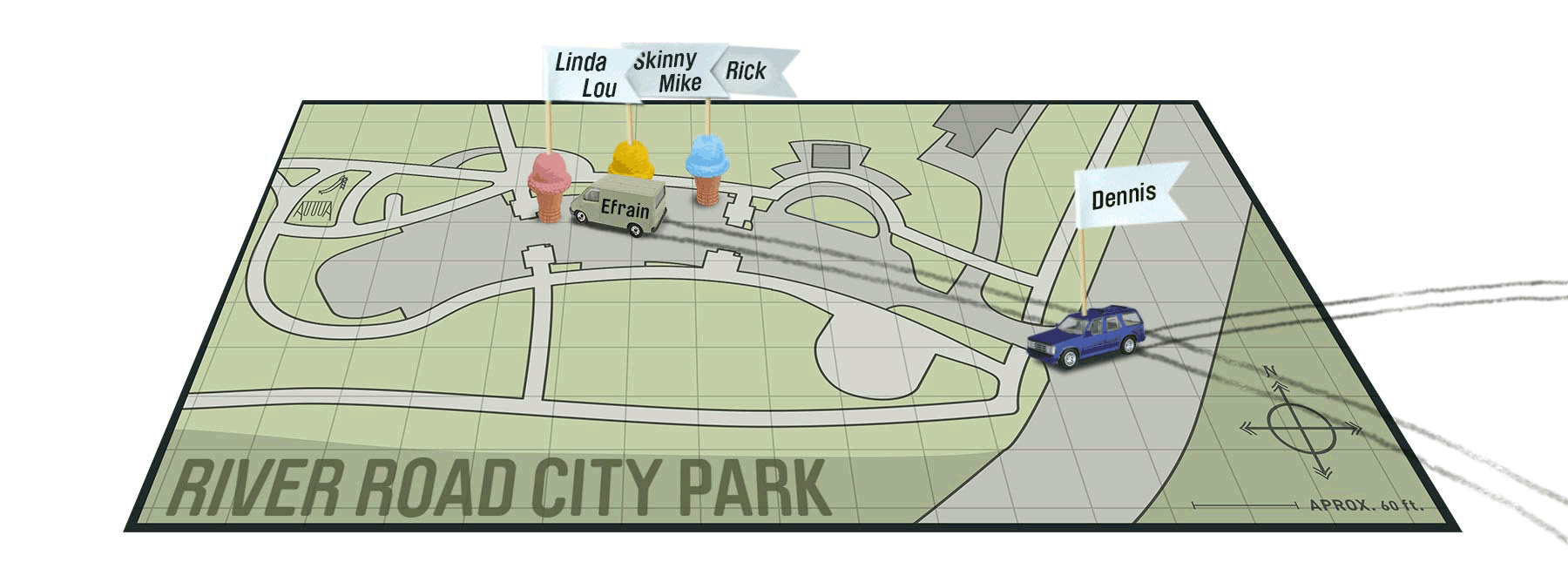
“Half price ‘em,” Dennis told Crash.
Crash didn’t like the idea — she still believed in Dennis’s original doctrine of accommodation and fair play — but she was loyal, and Dennis sounded like he wanted blood.
“Everything half price!” Crash shouted.
“Everything half price!” Rick echoed.
Efrain fumed as Crash, who was closer to the playground, siphoned off most of the business. Surrounded on all sides by Dennis's fleet, Efrain couldn't easily back out or turn away. For the first time since that night on Clearview, he lost his cool.
Unleashing an angry stream of Spanish, Efrain turned his steering wheel this way and that, accelerating forward and reversing suddenly in a 23-point maneuver. He slipped through the narrow gap behind Crash and sped off. Dennis sent his units in pursuit.
“For the next 10 or 20 stops he tries to make, we are going to be there,” he said. Dennis had been planning this campaign for months, running it over in his mind many times. He called it the Four-Truck Gang Bang.
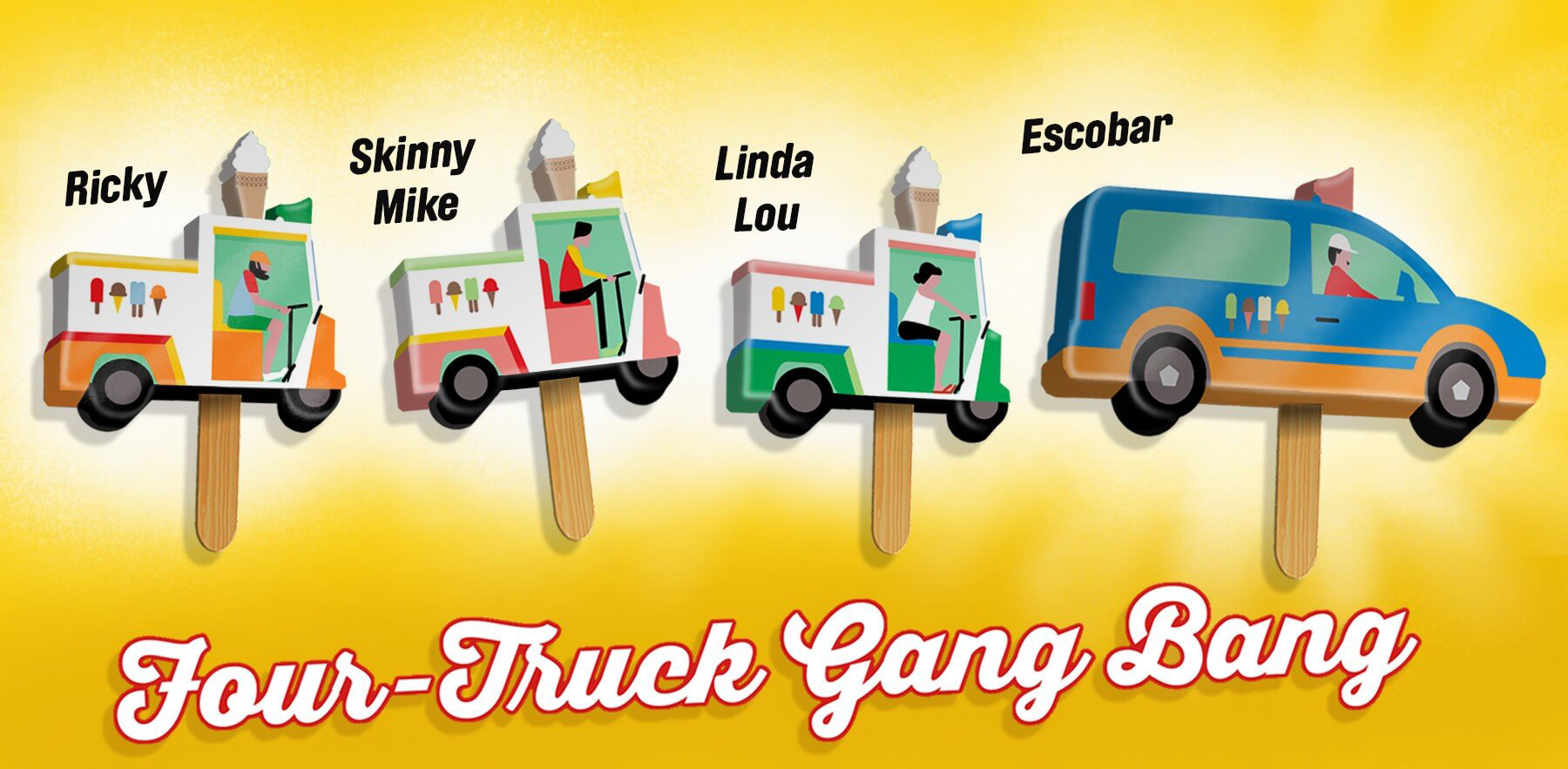
As Efrain turned right onto River Road opposite the Les Schwab tire shop, Skinny Mike, Crash, and Rick pulled into formation behind him. In Efrain’s rearview mirror, Dennis finally showed himself, behind the wheel of the Explorer, flanked by his squad.
Efrain tried to ditch them in a residential neighborhood, but the Keizer crew stayed on him down Riviera and Dreamerie Streets. Efrain stepped on the gas. No more playing around. He turned onto Commercial Avenue and punched it, knowing the trikes couldn’t possibly keep up. Dennis zoomed past his own units to keep tight on the target. Efrain turned down River Street and Dennis followed, relaying his position back to the team.
“This is crazy, Dennis,” Crash said. She had always been a reluctant warrior in this war, and now she felt vulnerable in her cart, pushing the Go-4’s limits to 40 miles per hour — and to what end? “I’m done,” she said, falling out of formation and peeling away.
If Dennis heard, he didn’t respond. “Keep coming,” he told the other drivers. They followed Efrain in a jingling convoy. For the next 20 minutes, every time Efrain made a stop, the Keizer crew was there. Kids opened their front doors to find three or four ice cream trucks pulling up at once, their drivers yelling over each another to announce that everything was half price.
These guys are crazy, Efrain thought. But if the madman expected him to be scared, it wasn’t working. Finally, Efrain realized Dennis was going to follow him as long as he tried to hand popsicles out the window, and so he decided to disengage altogether. Dennis watched Efrain turn back on Commercial Avenue and dart toward downtown at 70 miles an hour, leaving the Keizer caravan behind.
“He’s taking off!” Dennis declared, triumphantly.
“That was fun,” Mike said through the phone to his boss. "But also kind of stupid.”
Yet Dennis’ tactical success was a pyrrhic victory: one ice cream truck driver chasing another, alarming kids, and losing money in the process. What would happen when Efrain showed up again — another vehicular Gang Bang in front of children?
After the glow of battle faded, Dennis knew that he hadn’t exactly been living up to the ideals that made him believe in ice cream in the first place. If ever there was a vehicle that should always take the high road, he realized, it was an ice cream truck. To save his business, and perhaps even his sanity, Dennis had to find a way to break the endless cycle of provocation and retaliation. It was a Hail Mary pass and he knew it, but there was no other option: Dennis and Efrain would have to work things out.
5. ARMISTICE
It was a sunny spring afternoon in 2015 when Dennis and Efrain took seats across from one another in a coffee shop near the Salem airport. Efrain’s black and red tracksuit stood out next to Dennis’s all-grey ensemble. Efrain took his coffee black, while Dennis worked a large mocha topped with whip cream.

“I thank you for coming,” Dennis said, a little stiffly.
“Sure,” Efrain said. He was guarded and didn’t know where this was headed.
Dennis took the lead, plunging into a list of complaints: Efrain boxed his drivers in, dropped prices, even catcalled people. Efrain sighed or shook his head in denial at each allegation. Sure, he’d made mistakes, but they both had. Dennis’s drivers weren’t exactly angels, he said.
“The skinny one,” Efrain continued, “one time he drove for ten or fifteen minutes in front of me.” He described how Mike had found him on the road one day and pressured him like a racecar driver on a straightaway, weaving left and right to keep Efrain from passing.
Dennis admitted that was his fault. “He was acting under a direct order,” he said.
“Perhaps we both have made rash decisions on how we deal with each other,” Dennis continued. “I could’ve definitely been more diplomatic at certain times.”
“That’s true,” Efrain agreed, nodding. Despite the opening volley, Efrain wasn’t nervous. As far as he was concerned, he hadn’t overstepped any boundaries. Maybe he could have been more diplomatic at times, but it was Dennis who had escalated the conflict — twice.
Dennis didn’t want the conversation to get stuck in an infinite loop of accusations and denials. This sit-down was a chance, maybe the only chance, to get answers, clear the air and possibly find common ground. He gradually changed the subject to their mutual interest: the ice cream trade. The two talked at length about different aspects of the business; where to buy product, competitors who had come and gone, regulatory hassles. Start accepting credit cards, Dennis urged Efrain. “It increases your profits immediately.”
Dennis had emptied his massive mocha and was fidgeting with the cup. Efrain’s coffee sat untouched after nearly an hour.
After a pause, Dennis said he appreciated Efrain’s tenacity. “I give you respect for that,” he offered.
Efrain nodded. “Well, I’m happy, and I give you respect,” Efrain said in response.
There it was: an opening. Glasnost.
“Sometimes I think we both enjoy antagonizing the other,” Dennis observed.
Efrain considered it for a moment.
“Yeah,” Efrain said finally. “I think that’s true.”
Dennis had laid the ultimate card on the table: acknowledgement that their fight was futile. There was no rational explanation for the Cold War — no reason for two men to fight over something so much they were willing to destroy it. They needed a way out, a recognition of their shared humanity.
“This next year, there will be one little girl working a cart,” Dennis said. “I will take it very personally if she is harassed in any way.” This was something that had been eating him for months. It may even have been the true reason he was sitting at this table. He leaned in and looked Efrain in the eye. “She is my daughter.”
Jazmyne was turning 14 this spring. It had been ten years since her tears over a mangled popsicle had propelled Dennis into the business. He planned to set her up with a pushcart at River Road City Park a few afternoons a week. “This will be her first job. I ask for respect for this one person, more so than you would give to anybody else.”
“Well, I never talk to any of your employees, you know?” Efrain said. “Never. Anybody — ”
Dennis cut him off. He didn’t want to re-litigate the past. Dennis appealed to Efrain as one father to another. “Family is different,” he said. “And that’s something we both understand.”
“Yes,” Efrain said. “I do understand that.”
Dennis decided that this was the moment to float his big idea, an idea that only weeks ago would have seemed ludicrous. Both men had to drive once or twice a week to Portland to stock up from the region’s only wholesalers. That was six hours a week spent commuting rather than selling. “So why the hell are we both driving to Portland?” Dennis asked. Why not team up?
He and Efrain were the two main players in the Salem ice cream world, successful enough between them to crowd out any serious rivals. At the same time, neither would ever be big enough to force the other out of business.
Dennis had even thought ahead further, and suggested that they could set up their own ice cream distribution hub in Salem. They could service the whole area! Eugene, Stayton, Lincoln City, Woodburn — every one of those cities was a market ripe for expansion.
The plan would involve significant investment and risk. A large enough cold storage space, plus enough product to get them started, could cost as much as $75,000. And if someone didn’t show to pick up an order, they would be left holding the bag. But if they did it right, they could set themselves up as the ice cream kingpins of central Oregon.

First, though, they would have to trust each other.
“We can’t agree on everything,” Dennis said.
“Yeah. Definitely. No.”
“But if you and I swing that size stick, there is nobody in this town that drives an ice cream truck who will not listen.”
The thought had occurred to Efrain before. Still, he was surprised to receive a business proposal from the guy who had threatened him to his face and once chased him all over town. But Efrain was a man who understood opportunity. That’s what got him here — to the U.S., to the ice cream business, to this negotiating table.
“There’s no limit to what could happen,” Dennis said. Efrain agreed to think about it.
They stood up, smiled, and shook hands for the first time. There were kids out there waiting for their trucks to come around the corner.

Dennis Roeper and Efrain Escobar are currently exploring business opportunities together.





